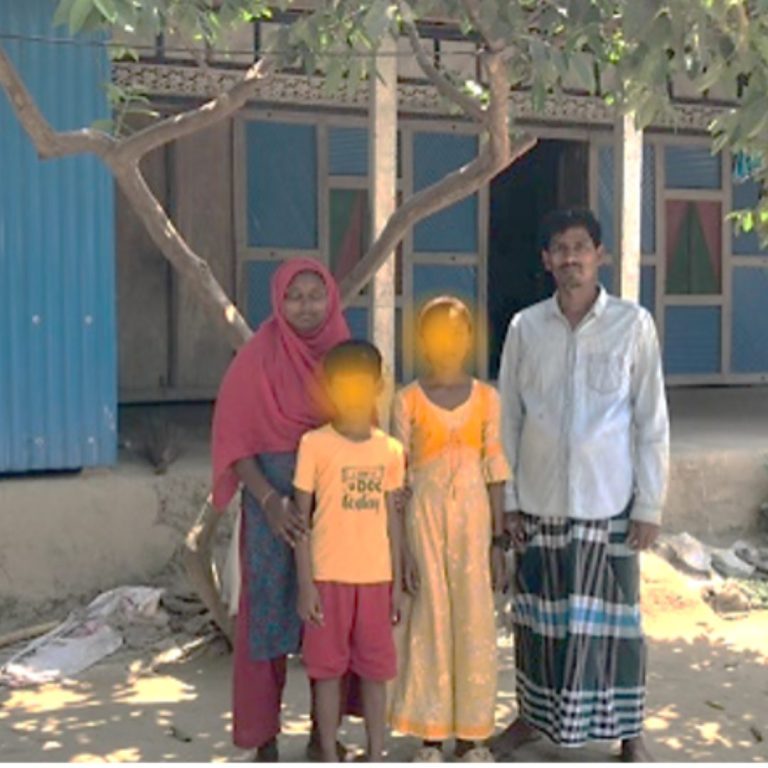Subarna (left) with her children (centre) and her husband Shahidul (right).
Sometimes our stories make escaping poverty sound like a recipe – meet Symbiosis, learn, save, loan, work, and presto!
Symbiosis does follow a simple process on paper, which is on purpose. We need to work with communities using a model they understand, work within the local economic and social structures and ensure people with no education can truly consent to engage in the process – after all it is their life and their savings.
Our model isn’t magic, it’s a process which involves work. Poverty grips people’s lives in more ways than we can convey. The model is effective but it doesn’t happen overnight.
A day spent in the field, tending to family duties, trying to learn to read as an adult and turning up to regular group meetings is not simple. Saving money is still a sacrifice of income which could be used to just get by. Time spent in a classroom is time not trying to provide what you can for your children.
Meet Subarna
Subarna lives in a village in the Dhaka district. Subarna maintains the family home and her husband Shahidul is an agriculture farmer. They are working hard to raise their son and daughter.
Prior to 2017, Subarna and her husband had no land to cultivate and no savings. Their tin shed home had one room and one kitchen area. The household daily income at this time is Tk. 400-500, which is less than $4.65 (USD) per day for the entire family. The international poverty line stipulates that less than $2.15 (USD) per person per day is extreme poverty. Subarna’s family is on $1.16 (USD) or less per day.
Subarna had the urge to do something for the family but couldn’t find a way.
Joining the Jaba Women’s Group
Subarna became a member of Jaba Women Group in 2017 when she met a Symbiosis staff member. She became one of 23 members in the group.
Jaba group members make weekly deposits of up to Tk. 50. Subarna turns up, saves what she can and after a period of time her personal savings are enough for her group to approve a loan which allows her to cultivate vegetables on Barga land*.
This is hot work. Through the change of seasons, wind, rain, flood and humidity, eventually Subarna cultivates enough vegetables to repay her loan, appease the landowner and purchase a goat!
Subarna scales up
Her next reported profit from the sale of vegetables was Tk. 70,000 (645.91 USD). If you consider that one kg of vegetables costs Tk 50, that’s not just a lot of vegetables, it is a lot of work in the field, at the markets while still managing the family home and two children at school.
But Subarna doesn’t stop, why would she; her life is slowly changing. We found out she was actually cultivating vegetables across 3 bighas* of barga land and her last reported profit was Tk. 125,000/ (1153.41 USD). With this profit and the money previously saved, she buys six bull calves.
A different life today
Currently she tends to four goats and six bulls as well as the barga fields. She plans to sell her cows next Eid for a tidy profit. Shahidul is also helping her in the vegetable venture and together they are very successful farmers. But it has taken six years of hard work, everyday.
Currently, Subarna’s family earns an average of Tk. 1000-1200 per day. They are self- sufficient and living a very comfortable life.
Subarna says with great joy that Symbiosis has helped her to make a positive change in her life financially through the activities of the Jaba Women’s group. Being part of Jaba has benefited her a lot. From that income and all of the work she put in to get there, the quality of life for her family improved.
*Barga land – refers to a piece of land that gets cultivated nt by the owner but someone else on a condition that a share of the produce must be given to the owner.
*Bigha – (in South Asia) a measure of land area varying locally from 1/3 to 1 acre ( 1/8 to 2/5 hectare).
